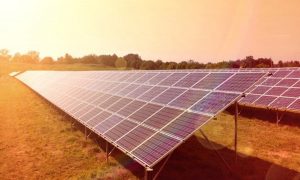- Advertisement -
The lowest bid in India’s latest auctions for 750 MW of solar projects at Bhadla, concluded before Christmas, arrived at INR 2.47 (USD 0.04/EUR 0.032) per kWh, which is slightly above the record-low bid of INR 2.44/kWh from May.

Hero Future Energies made the best offer and won 300 MW in the 500-MW tender for Bhadla solar park phase III, held by the Solar Energy Corporation of India (SECI). SB Energy Corp of Japan won the other 200 MW with a bid of INR 2.48/kWh.
The second part of the auction, targeting 250 MW, was won by Azure Power Global Ltd with a bid of INR 2.48/kWh for 200 MW, and ReNew Power Ventures Pvt Ltd which bid INR 2.49/kWh and got the remaining 50 MW.
The prices at which companies in India can buy photovoltaic (PV) modules in the future are quite uncertain as there is an anti-dumping case in progress in the country, and researchers say that global supply might be tight in 2018. In fiscal 2016/17 India imported about 89 percent of the modules it needed, mainly from China. There, demand for solar equipment has jumped leading to an increase in solar prices in the past few months.
According to Renewable Now, Raj Prabhu, CEO of Mercom Capital Group said “The low bids show that the developers are really desperate to win a project even if the returns are not that great,”. He explains that companies want to keep their Indian teams busy in anticipation of huge tenders. The government in November unveiled a plan for two solar tenders of 3 GW each in December 2017 and January 2018, while an additional 11 GW will be tendered in February in March.
The overall teledensity in India is now at a high of 93.42 percent with teledensity in rural areas at 56.78 percent,” the statement read, adding that as on end of September 2017, the total subscription stood at 1207.04 million including 501.99 million were in the rural and 705.05 million in the urban areas.
The department, in August, granted a license to state-run Bharat Sanchar Nigam Limited (BSNL) FOR THE putting up of satellite-based service using India gateway. In a partnership with Inmarsat, a British satellite communications company, BSNL is working to allow satellite telephony to private persons as well as in-flight communication (IFC) services.
In May this year, the department launched Tarang Sanchar, a Web portal of information sharing on mobile towers and EMF (electromagnetic frequency) emission compliances, with a view to bring confidence and dispel misconceptions among citizens.
In addition, the department has also launched extensive nation-wide awareness program on EMF emissions.
- Advertisement -




























